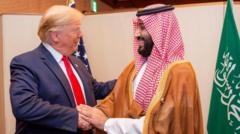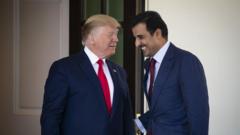Ukrainian President Zelensky's response to Putin's offer of talks reveals a cautious optimism, while Trump's potential next steps could sway the balance of the ongoing conflict.**
The Geopolitical Balancing Act: Trump's Influence on Ukraine and Russia Dialogue**

The Geopolitical Balancing Act: Trump's Influence on Ukraine and Russia Dialogue**
Tensions mount as diplomatic overtures from Putin are met with caution from Ukraine, while Trump’s role looms larger in the potential for peace.**
In a landscape marked by cautious diplomacy, Ukrainian President Volodymyr Zelensky has responded to Russian President Vladimir Putin's late-night proposal for direct talks with a moderate tone. Rather than outright condemning Putin for resisting a requested 30-day ceasefire, Zelensky described the overture as a "positive sign" signaling Russia's willingness to consider peace. His comments, shared on social media, suggest a delicate balancing act; Ukraine holds firm to its demands while remaining open to dialogue.
Zelensky's call for a confirmation of the 30-day ceasefire, expected to commence on Monday, reflects Ukraine's strategic positioning amid ongoing hostilities. Analysts interpret his response as a recognition of the optics at play, as neither Zelensky nor Putin wishes to appear coercive or intransigent to U.S. President Donald Trump, whose influence in this geopolitical framework remains significant. Trump, utilizing his Truth Social platform, expressed optimism about the possible end of hostilities, suggesting that a resolution may be within reach.
However, Putin's framing of the dialogue—focused on addressing what he describes as the “root causes of the conflict”—raises concerns. He demands that Western nations cease military support for Ukraine prior to any ceasefire implementation, effectively weakening Ukraine's defensive capabilities against potential Russian advances. The stakes are further heightened by the continuous threats of air strikes and missile attacks, as evidenced by recent drone launches towards Kyiv, which underscore the urgency of sustaining military aid for Ukrainian defenses.
As the situation develops, the pivot point lies with Trump and how he chooses to engage with the unfolding geopolitical dynamics. Will he view the Kremlin’s overtures with skepticism, potentially urging a more defensive posture from Ukraine? Or will he leverage his historical rapport with Putin to broker a more conciliatory approach, pressuring Ukraine to acquiesce to Russian demands in the pursuit of peace?
In this context, the balance of power and diplomatic maneuvering will be crucial in determining whether the path forward leads to a cessation of hostilities or further escalation. As the world watches closely, the next steps taken by Trump in this intricate geopolitical scenario will undoubtedly shape the fate of Ukraine and its quest for sovereignty amidst the looming specter of Russian aggression.




















